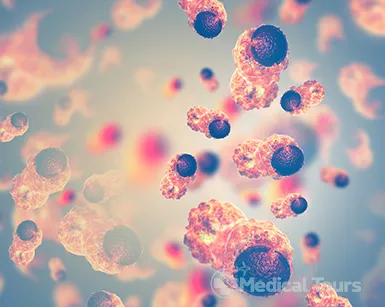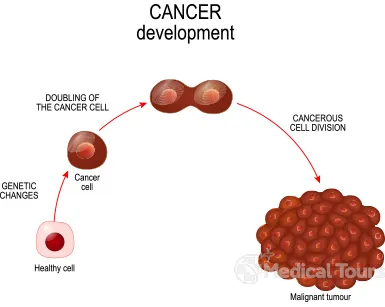What is Cancer?
The uncontrolled cell of abnormal cells in the body is called cancer. These cells possess the ability to infiltrate and destroy normal body tissues. It develops when the body's normal control mechanism stops working. It can spread throughout the body and is considered the second-leading cause of death in the world. There are over 100 different types of cancer, each named after the type of cell or organ from which it originated. Cancer cannot be considered a single disease; rather, it is a collection of diseases.
Types of Cancer
Cancer can be categorized into different groups, some of the major categories of the disease can be:
Carcinoma
Carcinoma is a type of cancer that begins in the skin or the tissue lining organs such as the liver or kidneys. Carcinomas, like other types of cancer, are abnormal cells that divide uncontrollably. They can, but do not always, spread to other parts of the body. It can be further categorized into subtypes that include basal cell carcinoma, transitional carcinoma, adenocarcinoma, and squamous cell carcinoma.
Sarcoma
It is a type of cancer that can occur in various parts of the body. It is a general term used for a broad group of cancers that begin in bones and soft tissues. Sarcomas develop in connective tissue, which is made up of cells that connect and support other types of tissue in your body. These tumors are most common in your arms and legs' bones, muscles, tendons, cartilage, nerves, fat, and blood vessels, but they can occur anywhere in your body.
Leukemia
Leukemia is cancer of the body's blood-forming tissues, including the bone marrow and the lymphatic system. It exists in many types, and some of its forms are quite common in children. This causes swollen lymph nodes, recurrent nosebleeds, tiredness, frequent infections, weight loss, bleeding, and bone pain.
Myeloma and Lymphoma
These are two interrelated malignancies having a lymphoid origin. Both are cancers that affect cells in a person’s blood and usually start from the cells of the immune system.
Germ cell tumor
Germ cell tumors are growths that form from reproductive cells. It normally occurs inside ovaries and testicles.
Blastoma
A blastoma is a type of cancer, more common in children, that is caused by malignancies in precursor cells, often called blasts. Examples are nephroblastoma, medulloblastoma, and retinoblastoma.
Stages of Cancer
- Stage 0: In this stage, the cancer is in place or is located in the place where it started. In this stage, cancer is often curable and can be completely removed through surgery.
- Stage I: In this stage, cancer does not usually grow deeply into nearby tissues. Often known as the early stage of cancer where cancer has not separated to lymph nodes or other parts of the body.
- Stage II & III: In these two stages, cancers have grown more deeply into nearby tissues, they may have also spread into lymph nodes but no other parts of the body.
- Stage IV: This is the stage where cancer starts spreading to different parts of the body, usually this stage is termed advanced or metastatic cancer.
Symptoms of Cancer
General signs and symptoms associated with, but not specific to cancer include:
- Fatigue
- Persistent cough
- Difficulty swallowing
- Changes in bowel or bladder habits
- Persistent, unexplained muscle or joint pain
- Persistent, unexplained fevers or night sweats
- Persistent indigestion or discomfort after eating
- Weight changes, including unintended loss or gain
- Lump or area of thickening that can be felt under the skin
- Changes in the skin, such as yellowing, darkening, or redness, sores that will not heal, or changes to existing moles
Causes of Cancer
Cancer is not caused by a single cause; the interaction of many factors together causes cancer. It is considered a complex group of diseases. Most cancers are related to environmental, lifestyle, or behavioural exposures. Cancer is not contagious in humans, though it can be caused by oncoviruses and cancer bacteria.
Certain risk factors are known to increase the chance of cancer:
Obesity
Many types of cancer are more common in people who are overweight or obese, including cancers of the breast, bowel, lining of the womb (endometrium), esophagus, pancreas, kidney, liver, stomach, ovary, thyroid, myeloma, and brain (meningioma).
Age
The older you get, the more likely you are to develop cancer. This is due to the accumulation of cell damage over time. Furthermore, as you get older, your body's defenses and resistance to abnormal cells may deteriorate. The ability to repair damaged cells, for example, and the immune system, which can destroy abnormal cells, may become less efficient with age. As a result, one damaged cell may survive and multiply uncontrollably into cancer. The majority of cancers occur in older people.
Radiation
Radiation is a carcinogen. For example, exposure to radioactive materials and nuclear fallout can increase the risk of leukemia and other cancers. Too much sun exposure and sunburn (radiation from UVA and UVB) increase your risk of developing skin cancer. The larger the dose of radiation, the greater the risk of developing.
Lifestyle factors
People eating a lot of fruits and vegetables are less likely to have certain types of cancers whereas it is evident that intake of red meat or processed meat increases the risk of cancers, especially bowel cancer. The risk of the development of certain types of cancer is also increased by the consumption of alcohol.
Chemical carcinogens
Excessive intake of nicotine can cause cancer of the lung, mouth, throat, esophagus, bladder, and pancreas. Sometimes working with chemicals like asbestos, benzene, formaldehyde, etc. Without any precaution also increases the risk of developing certain cancers.
Note: People with poor immune systems develop a risk of cancers and some cancers have strong genetic links.
What Prevention Can Be Done to Cure Cancer?
Cancer prevention refers to active measures to reduce cancer risk. The vast majority of cancer cases are caused by environmental factors. As a result of our lifestyle choices, we have control over many of these environmental influences. As a result, cancer is usually preventable. Environmental factors cause between 70% and 90% of common malignancies, making them potentially avoidable. Tobacco, excess weight/obesity, poor diet, physical inactivity, alcohol, sexually transmitted infections, and air pollution are all risk factors that could be avoided to prevent more than 30 percent of cancer deaths. Poverty may also be regarded as an indirect risk factor for human cancers. Some environmental factors, such as naturally occurring background radiation and cancers caused by hereditary genetic abnormalities, are uncontrollable and thus cannot be avoided through personal action.
How to Diagnosis Cancer?
Depending upon the type of cancer different ways can be used to diagnose cancer:
- X-Ray
- Bone scan
- Lab tests
- Ultrasound
- Nuclear scan
- Imaging tests
- MRI (Magnetic Resonance Imaging)
- CT (Computerised Tomography) Scans
- PET (Positron Emission Tomography) scan
- Biopsy (with needle, endoscopy, or surgery)
Treatment Options for Cancer
The type of cancer, its stage, whether cancer has spread, and your overall health all influence treatment options. The goal of treatment is to eliminate as many malignant cells as possible while minimizing damage to neighboring healthy cells. This is made feasible by technological advancements.
Surgery
The tumor is surgically removed.
Chemotherapy
A process of killing cancer cells with chemicals.
Radiation Therapy
The use of X-rays to kill cancer cells is known as radiation treatment. Such therapy of radiation can come from a machine outside your body (external beam radiation) or from inside your body (internal beam radiation) (brachytherapy).
Bone Marrow Transplant
The fluid inside your bones called bone marrow produces blood cells from blood stem cells. A bone marrow transplant, commonly known as a stem cell transplant, can employ either your own or a donor’s bone marrow stem cells.
A bone marrow transplant allows your doctor to treat your cancer with larger chemotherapy doses. It can also be used to replace bone marrow that has become diseased.
Immunotherapy
Immunotherapy, often known as biological therapy, is a cancer treatment that makes use of your body’s immune system. Because your immune system does not detect cancer as an intruder, it can thrive unchecked in your body. Immunotherapy can assist your immune system in “seeing” and attacking cancer.
Hormone Therapy
Some cancers are driven by hormones in the body. Breast cancer and prostate cancer are two examples. Cancer cells may stop developing if such hormones are removed from the body or their effects are blocked.
Targeted Drug Therapy
Targeted medication therapy focuses on cancer cells’ unique defects that allow them to survive.
Cryoablation
Cold kills cancer cells with this treatment. A thin, wand-like needle (cryoprobe) is introduced through your skin and directly into the malignant tumor during cryoablation. To freeze the tissue, a gas is fed into the cryoprobe. The tissue is then allowed to defrost. To kill cancer cells, the freezing and thawing process is performed numerous times during the same therapy session.
Radiofrequency Ablation
This treatment heats cancer cells, causing them to die, and utilizes electrical energy. During radiofrequency ablation, a doctor inserts a small needle into the cancer tissue through the skin or an incision. High-frequency radiation goes through the needle and heats the surrounding tissue, killing the cells in the area.
Cancer Treatment Cost in India
Cancer treatment in India is a very cost-effective option. The top hospitals offer affordable medical care cost packages that cover several services during the treatment. The cancer treatment cost in India start approx USD 500 (INR 38,000) to USD 8000 (INR 6,11,000).
The cost of cancer treatment in India may vary, but it usually ranges:
| Treatment |
Cost |
| Chemotherapy |
USD 500–1000 Approx./ Month |
| Immunotherapy |
USD 8500 |
| Breast cancer surgery |
USD 2000 – 4000 |
| Prostate cancer treatment |
USD 6000 – 8000 |
| Breast conservation surgery |
USD 3000 – 4000 |
| Transarterial radioembolization or TARE |
USD 30,000 |
| Transarterial chemoembolization or TACE (Trans Arterial chemoembolization) |
USD 7000 – 8000 |
The exact cost of cancer treatment is determined based on many factors, including the type and stage of cancer, recommended course of treatment, post-treatment care required, length of hospital stay, and many others. The prices also vary for different hospitals and doctors.
FAQs
Cancer is the uncontrolled growth of abnormal cells within a part of the body that might spread to other areas of the human body.
Cancer not only causes bodily life-threatening illness status but also contributes to the psychological and fiscal crisis in a patient’s lifestyle.
This was the situation sooner but today with all the healthcare progress the prognosis and life expectancy is great.
Metastasis implies that cancer (tumor cells) has spread into other parts of human anatomy and invading there, the outcomes of metastasis might be severe life-threatening.
Some are added to every letter to indicate the size or extent of the principal tumor and the degree of cancer spread (higher number indicates a larger tumor or more disperse).
40 percent of cancer Brought on by tobacco or pan masala particularly the oral and lung cancer.
- Approximately 10 percent could be due to hereditary causes for example breast and ovarian cancer.
- Approximately 15 percent could be due to obesity such as breast, uterus, etc.
- 5 percent may be dietary and food preservation including stomach cancer.
- Approximately 30% of cancer Don’t Have Any unknown triggers such as pancreatic cancer.
Anyone can create cancer; however, the danger of getting it increases with age.
Certain cancers could be connected to a few occupational dangers.
Oncologist is specialized doctors for the treatment of cancer, maybe a surgical oncologist, radiation oncologist, or medical oncologist.
Any persistent bulge or swelling
- Sudden bleeding
- Like coughing blood
- Bleeding from gut/pee
- Encourages weight loss
- Persistent cough Especially If You’re a smoker
- Difficulty swallowing
- Changes in your voice
- Mouth or tongue ulcer for over 3 weeks
- New mole or modifications from an existing mole
About two-thirds of that cancer is associated with lifestyle and can be averted
- Obesity is among the largest risk factor for cancer.
- By preventing tobacco use around 30 percent of oral and lung cancer cases could be prevented
- Normal screening also helps notably in prostate cancer for guys and cervical and breast cancer cases in guys.
Following the individual presents with symptoms that are imagining, a Battery of tests and analyses are performed to confirm the diagnosis of malignancy
- Biopsy
- Endoscopy
- Detection and therapy help?
- It is essential to Be aware of symptoms and diagnose it. First disease stages as early detection and treatment may make a powerful effect on the disease prognosis in fact at many times can be life-threatening or cause fewer complications, since also lessens the healthcare expenses and clinical intervention.
The major treatment for cancer would be:
- Chemotherapy: During this, compounds are Utilized to kill cancer Cells
- Surgery:In this, cancer is directly removed
- Radiation therapy: In this X-rays are used to kill the cancer cells.
- Based on every situation there may be only 1 treatment Program or a combo of all.
Chemotherapy is a treatment system that utilizes powerful chemicals to destroy fast-growing cells inside the body.
Chemotherapy drugs may be given in various ways, such as:
- Chemotherapy infusions
- Chemotherapy pills
- Chemotherapy shots
- Chemotherapy lotions
- Chemotherapy drugs are used to treat 1 area of the human body. Example chemotherapy medications can be given right in the gut -intraperitoneal chemotherapy
- Chemotherapy is given straight to the cancer
If you can work through therapy depends upon:
- The Sort of treatment You’re getting
- Your General Health
- The type of work you do
- The way you are feeling during therapy.
- Doctors can limit some of your actions.


